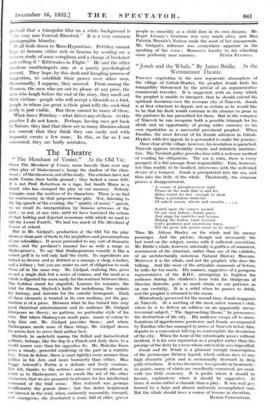The . Theatre
" The Merchant of Venice." At the Old Vic. OVER The Merchant of Venice; more- heavily than over any other play of Shakespeare's, hangs the shadow of the class- room ; of the classroom, not cifthe study. The scholars have not made Venice their battle ground ; they lacked a cases It is not Prof. -Robertson in a rage, but Smith Minor in a heard, who has stamped the play on our memory. Nobody wrangles over the motives of its characters. There is no fuel for controversy in that preposterous plot. Nor, listening to the big speech of the evening, the " quality of mercy " speech, do we recall its interpretation by famous actresses of the past ; or not, at any rate, until we have banished the echoes of that "halting and dejected monotone with which we used to lull the Lower Fourth. We had too much of The Merchant of Venice at school.
But in Mr. Gielgud's production at the Old Vic the play shows a clean pair of heels to the prejudices and preconceptions of our schooldays. It never pretended to any sort of dramatic unity, and the producer's manner has as wide a range as Shakespeare's. To say that Shakespearean comedy is like a mixed-grill is to tell only half the truth. Its ingredients are indeed as diverse and as distinct as a sausage, a chop, a rasher, and a kidney ; but you are under no sort of obligation to cook them all in the same way. Mr..Gielgud, realising this, gives us not a single dish but a series of courses, and the meal as a whole is digested the more easily for the contrast between them. The. Gobbos stand for slapstick, Lorenzo for romance, the trial for drama, Shylock's knife for melodrama, the caskets for fantasy, and Antonio for the comedie larmoyante. Each of these elements is treated in its own medium, yet the pro- duction is of a piece. Between what he has turned into very good theatrical entertainment and its audience Mr. Gielgud interposes no theory, no pattern, no particular style of his own. But where Shakespeare needs pace, music or colour to help him out, Mr. Gielgud provides them ; and where Shakespeare needs none of these things, Mr. Gielgud shows his actors how to serve their author best.
Shylock, in sackcloth among the frilled and fantasticated gallants, belongs, litre the dog in a Punch and Judy show, to a world nearer ours than his opposites do. Mr. Malcolm Keen gives a steady, powerful rendering of the part in a realistic key. Even in defeat, there is (and rightly) more menace than pathos in his Jew, and more humanity than either. Miss Peggy Ashcroft's Portia is a delicate and lively creature. Her wit, thanks to the actress's sense of comedy almost as much as to Shakespeare, so far excels the wit of the other characters that we are prepared in advance for her intellectual command of the trial scene. Miss Ashcroft was perhaps insufficiently the grande dame ; but this defect heightened our interest in-the trial, when, eminently reasonable, tranquil, and courageous, she dominated a worn full of older, graver
people as smoothly as a child does in its own dreams. Mr. Roger Livesey's Gratiano was very much alive, and Miss Patricia Macnab's Nerissa made the most of her masquerade. Mr. Gielgud's influence was everywhere apparent in the speaking of the verse : Morocco's loyalty to his schooling






























 Previous page
Previous page